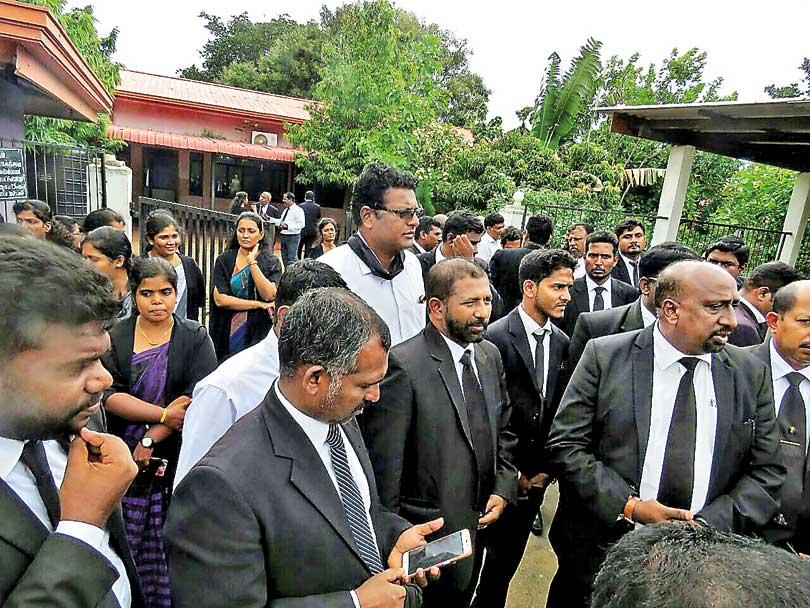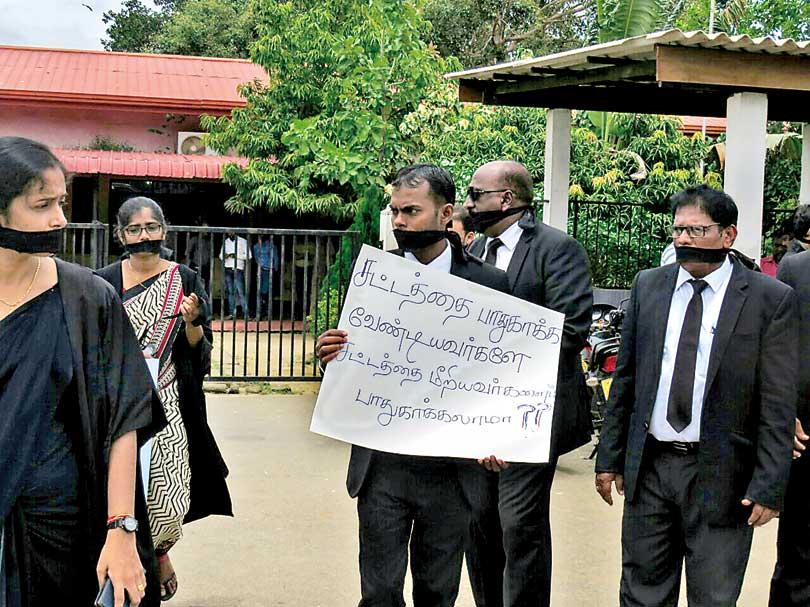Reply To:
Name - Reply Comment

A number of lawyers and civil society activists along with the general public in the North and East have come out in protest against the flouting of a judicial decision by Buddhist monks and their associates in relation to the final rites of a prelate.
The media reported that over 2,000 protesters demonstrated in Mullaitivu over the controversy in which emotions have run high and people’s sentiments been hurt. The dispute over the cremation site of the monk in the Northern District of Mullaitivu, which took place in defiance of a judicial order, has implications on the rule of law and confidence in the judiciary that needs to be resolved without delay. Prior to his demise, Venerable Colomba Medhalankarakitti Thera had established a temple on disputed land in front of an army camp in the former Northern war zone. The ownership of the land has been claimed by Neeraviyadi Pillaiyar Temple and the Archaeology Department. There is fury that the military and governmental departments claim domination over Northern land and then vest it with people from outside to the detriment of Tamil inhabitants of those areas. When this is done in respect to Buddhist temples sans a Buddhist civilian population, it is a cause for heartburn and misgivings in the North.
In the Hindu tradition, cremations are not permissible within temple grounds. Accordingly, the judiciary to whom the dispute was taken decided that the monk’s mortal remains should be cremated elsewhere, in an identified public compound. However, Buddhist monks belonging to a nationalist organisation were instrumental in ignoring the court order and conducting the cremation within the temple premises. One of the monks involved in this act was Bodu Bala Sena General Secretary Galagodaaththe Gnanasara Thera who had previously been convicted for contempt of court and sentenced to imprisonment but granted presidential pardon.
The undersigned civil society organisations unreservedly condemn the flouting of judicial orders and disrespect shown to the judiciary. We call on other civil society organisations, Buddhist and other religious leaders and political parties to do likewise. We believe upholding judicial decisions, the rule of law and separation of powers between presidency and State institutions as vital. The open defiance of judiciary and its facilitation by the executive branch of government will undermine confidence in the legal system. In particular, the State needs to be sensitive on minority cultures and to their perceptions. Unless people trust in the system of law and order as having finality rather than actions of the military and nationalist clergy, peace with justice will be a mirage.
The media reported that over 2,000 protesters demonstrated in Mullaitivu over the controversy
The Jaffna People’s Forum for Coexistence finds the incident which transpired at Neeraviyadi in Mullaitivu last week deeply disturbing. Since the dastardly Easter attacks, inter-religious relations have become more fragile in Sri Lanka. In this context, what happened in Neeraviyadi might aggravate already-strained ethno-religious coexistence. We have a duty to prevent incidents of this nature from repeating by initiating mutually-supportive conversation among different communities that inhabit the island.
On September 23, a group led by Buddhist monks including Gnanasara Thera of Bodu Bala Sena cremated the remains of the late Ven. Colomba Medhalankarakitti Thera, Chief Incumbent of Gurukanda Rajamaha Viharaya, on a site in Neeraviyadi thus violating a court order. Local Hindus view this site as belonging to Neeraviyadi Pillaiyar Temple. Since most Hindus consider the cremation of mortal remains within the premises of Hindu religious places a sacrilege, the locals protested against the cremation and obtained a court order which required the cremation to be held outside the disputed site in a location assigned by court. The police did not take any action against those who violated the court order; neither did they prevent them from attacking the locals who wanted the court order implemented.

When local Hindus protested against the construction of the present Gurukanda Rajamaha Viharaya after the end of the war in a location which they consider as part of the premises of Neeraviyadi Pillaiyar Temple, the Archaeology Department defended the construction claiming an ancient Buddhist Dagoba existed in that location some two thousand years ago. However, the Maritimepattu DS Division, within which the disputed site is located, observed that no Buddhist temple had existed in the land where Neeraviyadi Pillaiyar Temple was situated and that there was no evidence to support that Buddhists lived in the neighbourhood. These competing ethno-religious claims require the issue to be resolved amicably and based on appropriate historical evidence; in a manner history is not used for legitimising exclusivist claims over territory and polarising the communities concerned.
The Jaffna People’s Forum for Coexistence wants to place on record that for the past several decades, the Archaeology Department has been engaged in politicising the history of the island, especially its Northern and Eastern regions, in ways that favour the agendas of chauvinistic politicians and communal-minded Buddhist monks. The department has often ignored religious and ethnic realities observed in places where minorities live in large numbers and the political and cultural changes that have taken place in those areas across the passage of time.
On Sept. 23, a group led by monks cremated the remains of the late Ven. Colomba Medhalankarakitti Thera in Neeraviyadi
The forum wishes to reiterate that the pluralist demographic history of the island spanning over 2,000 years is one of the constant movements of different communities which held multifarious political loyalties and regional habitation; that our intertwined and syncretic histories are well-established; to pit one community against another, to emphasise difference and separateness rather than cultural overlaps, ethnic entanglements and religious cross-pollination in interpreting this rich history for modern political purposes will prove to be destructive.
While registering our strong opposition to the actions of the State that pose a threat to religious, ethnic and linguistic pluralism and the coexistence of cultures and communities, let us ensure that our actions in the future will acknowledge that historically this island and its various regions have been home to different cultures, languages and faiths. Let us also ensure that we give a central place to coexistence in our social and political initiatives. The Jaffna People’s Forum for Coexistence recognises the strength of our diverse and inter-mixed past and calls for dialogue in resolving ethnic and religious disputes and to reclaim our plural history.
Jaffna People’s Forum for Coexistence